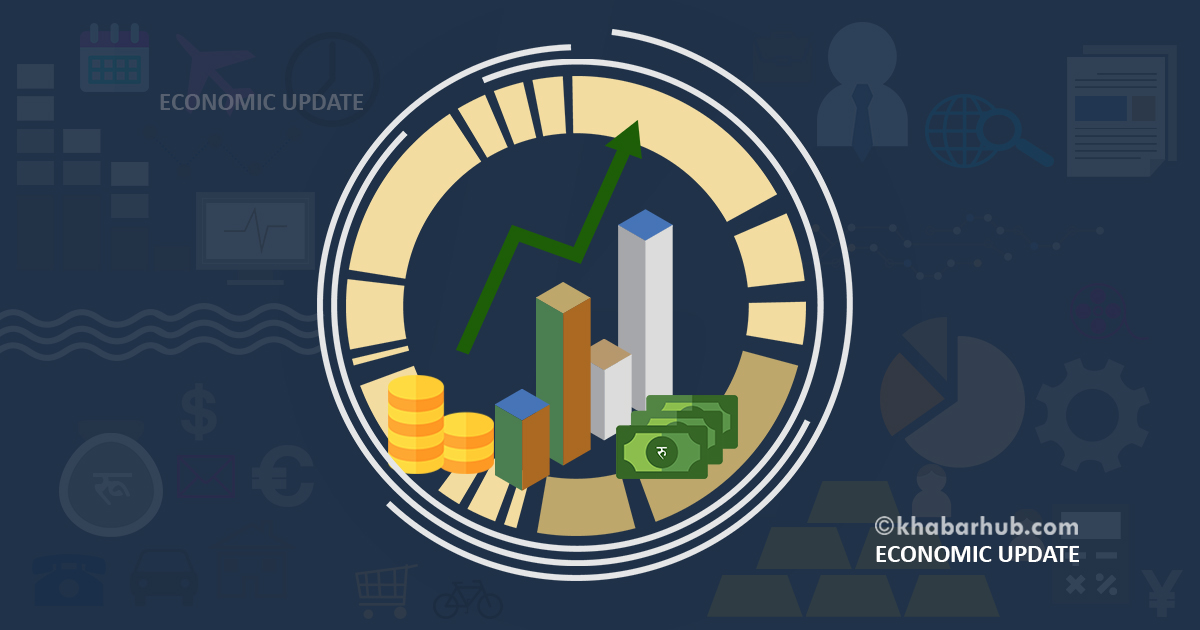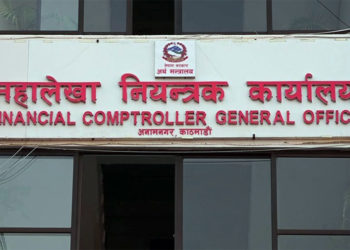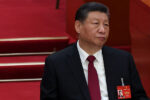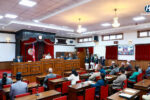KATHMANDU: Economic Digest offers a concise yet comprehensive overview of significant business happenings in Nepal, presented in easily digestible summaries.
Nepal’s macroeconomic outlook for FY 2024/25 presents a mixed yet somewhat positive picture, with inflation steady at 5.60%, indicating moderate price stability.
The country’s foreign exchange reserves stand at a robust USD 16.70 billion, enough to cover 15.1 months of imports, providing a solid buffer against external economic shocks.
While trade shows signs of recovery with a 4.2% increase in merchandise exports, driven primarily by an 8.4% rise in exports to India, challenges remain in sectors like palm oil and ready-made garments, and exports to China and other nations have declined.
Gold prices in Nepal also experienced notable fluctuations, rising sharply due to a combination of global price increases, inflation concerns, and seasonal demand, before slightly correcting.
This reflects the sensitivity of the gold market, influenced by both international economic factors and local demand cycles.
On the other hand, the NEPSE index has shown volatility, with a mix of losses and gains, highlighting underlying concerns like limited market liquidity, a lack of diversification in listed companies, and a dominance of a few sectors such as banking and hydropower.
This underscores the need for structural reforms and investor confidence-building measures in the capital market.
On a positive note, Nepal’s commercial banks have reported strong profits, with Nabil Bank leading the sector, although the development banking sector saw mixed results, with several banks posting losses.
Additionally, the appointment of Gorakh Rana as the first Nepali CEO of Standard Chartered Bank Nepal marks a significant achievement, reflecting the growing trend of local professionals taking leadership roles in prominent international institutions.
Mixed economic recovery evident in Nepal’s macroeconomic outlook for FY 2024/25
Nepal Rastra Bank’s macroeconomic and financial overview for the first four months of fiscal year 2024/25 presents a mixed yet somewhat positive economic outlook.
Inflation remains steady at 5.60% year-on-year, reflecting moderate price stability.
The country’s foreign exchange reserves stand at USD 16.70 billion, which is adequate to cover imports for 15.1 months, offering a solid buffer against external economic pressures.
On the trade front, merchandise exports have increased by 4.2% compared to the previous year, marking a recovery from the 7.7% decline observed last year.
This growth is largely driven by an 8.4% rise in exports to India, although exports to China and other nations have seen a decline.
Key export items such as soybean oil, tea, and polyester yarn demonstrate resilience in certain sectors, while challenges persist in markets for palm oil and ready-made garments.
Overall, the data suggests a mixed recovery, with some sectors performing better than others, and the trade balance remaining vulnerable to fluctuations in external demand.
Gold prices in Nepal: Seasonal demand and global factors
Between December 8th and 13th, 2024, the price of gold in Nepal exhibited a notable upward trend, rising from NPR 149,700 to NPR 154,200 by Thursday, before slightly correcting to NPR 153,000 on Friday.
The initial surge can likely be attributed to a combination of factors, including rising global gold prices, potential inflationary concerns, and increased local demand, driven by seasonal factors such as weddings and festivals.
Gold’s role as a safe-haven asset in uncertain economic times may have further amplified buying activity, particularly if the Nepali Rupee weakened against global currencies.
However, the slight decline on Friday suggests market volatility and possible profit-taking, as investors may have reacted to short-term price gains.
This fluctuation underscores the sensitive nature of gold prices, which are influenced by both domestic demand and broader international economic trends.
The price movements also highlight how local gold prices are often a reflection of global market conditions, yet they can be swayed by internal demand cycles and investor sentiment, making the market prone to both sharp rises and corrections.
As such, gold remains a relatively unstable yet important asset in Nepal’s economic landscape, vulnerable to a wide array of global and local economic dynamics. ‘
NEPSE index faces volatility amid limited liquidity and market concerns
The recent fluctuations in the NEPSE index highlight the volatility and underlying challenges faced by Nepal’s stock market.
Between December 8th and December 12th, the index saw a mix of losses and gains, with the most significant recovery occurring on December 11th, which rose by 1.71%, driven by investor optimism.
However, the subsequent decline on December 12th, marking a 1.23% drop, suggests that the market remains vulnerable to external factors and investor sentiment shifts.
These movements reflect the broader economic concerns such as limited market liquidity, a lack of diversification in listed companies, and the dominance of a few sectors like banking and hydropower.
Despite positive short-term movements, such as the recovery on December 11th, the market’s overall trend indicates the need for structural reforms, increased public awareness, and efforts to enhance investor confidence.
Furthermore, the limited number of listed companies and the small investor base indicate that Nepal’s capital market has yet to reach its full potential.
While the stock market remains an essential avenue for capital formation, its current performance underscores the necessity for a more robust regulatory framework and the development of more diverse, transparent financial instruments to foster sustainable growth.
Commercial banks report strong profits
Nepal Rastra Bank has published its financial performance report for commercial and development banks for the first four months of the fiscal year 2081/82, which ended in the Nepali month of Kartik.
The total net profit for commercial banks amounted to Rs. 22.29 billion, with Nabil Bank leading the sector with a net profit of Rs. 2.69 billion, followed by Global IME Bank, which earned Rs. 2.11 billion.
Nepal Investment Mega Bank ranked third with a profit of Rs. 1.82 billion. Other banks, such as Prime Commercial Bank and Kumari Bank, also reported strong earnings.
On the other hand, the Agriculture Development Bank recorded a net loss of Rs. 22.77 crore.
The development banking sector achieved a collective net profit of Rs. 2.03 billion, although eight out of the 17 development banks reported losses.
Gorakh Rana appointed as first Nepali CEO of Standard Chartered Bank Nepal
The appointment of Gorakh Rana as the first Nepali CEO of Standard Chartered Bank Nepal represents a key milestone in the bank’s history.
Rana, who has been with the bank since 1996 and most recently held the position of Deputy CEO, succeeds Anirbhan Ghosh Dastidar, following the completion of his four-year term.
With extensive experience in leadership roles within the bank, Rana is well-positioned to lead the institution into its next phase of growth.
This appointment also highlights a growing trend of local professionals assuming leadership roles at prominent international institutions in Nepal.
Petrol to cost Rs 161 per liter starting today
The Nepal Oil Corporation (NOC) has announced an increase in petrol prices while lowering the prices of diesel and kerosene.
As per a decision by the Corporation’s board, the price of petrol has been hiked by two rupees per liter, while diesel and kerosene prices have been reduced by two rupees per liter, effective from midnight.
The updated prices are NPR 159.50 per liter for first-category petrol, NPR 161 for second-category petrol, and NPR 162 for third-category petrol.
(Prepared by Srija Khanal)









Comment